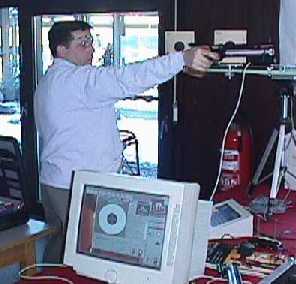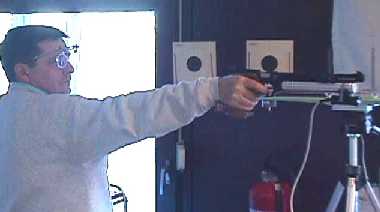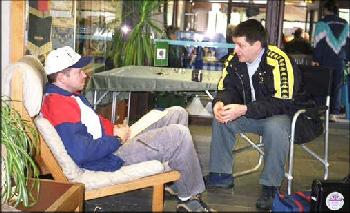INTERVIEW WITH MICHAEL GAULT
Mick Gault is one of England’s most successful international shooters, and has won eighteen medals across a bevy of competitions, including the Commonwealth Games. He is the most decorated shooter in history, along with Australian Philip Adams.
When did you get started shooting?
I was in the Air Cadets when I was something in my teens.
Like Boy Scouts?
Yes, Boy Scouts, and they started me off rifle shooting and we had an indoor range at 25 yards. We used to blow candles out at 25 yards. It was great fun and that’s how I started out.
What are you shooting now?
I am currently using an LP10. I’ve got an LP1 at home which I’m not selling because it’s worth a lot to me and I’ve got a P34 which I have tried but the LP10 in my opinion is better. It’s got the edge over the trigger, the trigger is very very simple on the LP 10 where the P34 is very complex. And I like to keep it simple, stupid – that’s my motto.
How do you feel the difference between the LP1 or the P30 is to the P34 & LP1 as far as the recoil absorber goes?
Oh yes, the new generation pistols with the vented barrels and the absorbers give no recoil at all. Whereas, the LP1 you got a little bit but the absorber in the vented barrel seems to have eliminated all the recoil. You can get a bit induced but that’s only because you’ve got grip problems. But yes, the P34 and the LP10 are definitely eliminating the recoil. As long as the absorber works properly, that is.
Who was your greatest influence on your shooting?
A chap called Alby Fox, I think. He’s an ex-RAF officer type chap. He started me off in the next step up from club level shooting where I started shooting for the Royal Air Force and he brought me on a little way. He was my early sort of influence and later on I took other influences from my coach George Darling and started to look at other people like Ragnar Skanaker and Uwe Potteck and people like this, try to emulate them.
What’s you most valuable practice drill?
Well that’s a secret…(laughs) No, it’s something I developed with my sports psychologist and we call it inoculation training where he makes me (or my wife in his place) do energetic exercises like run around the block for a mile. Then I have to do ten rounds in ten minutes and before that I have to tell my wife or my coach I’m going to shoot a 97, and this is the kind of drill I’ve got to go through. It’s sort of simulates coming to an international match where the sights start to move around, or you’re more aware of the sights moving around and your heart rate increases slightly . It simulates this, there’s lots of other little drills that we do but that’s basically what it is. It gets you excited.
How do you handle the mental game during the match?
Not very well at the moment (laughs). I try to treat every match as a practice match for the next one. I try to treat every match as a practice match for the next and I’m trying to get absorbed into the match, which is easy at home. At home my average is 580, I’m putting 85, 86 and 87 up, the odd one below 80 but very rarely, but when you come abroad you’re shooting on new equipment, electronic equipment and it’s hard to get absorbed into the match as much as when you’re at home shooting on paper cards. You shoot a 10 on a paper card, you take it down, throw it away and you go to the next shot. You shoot a 10 on electronics, it’s still there and it says 10 and your total is.., so you know exactly what you are doing and what you’ve got to do to get to your goal. And for years and years I’ve been taught not to do that, but now all of a sudden you’ve got to change and I’m finding it difficult to change. We haven’t got much of this electronic stuff at home, we’ve got about 3 units, something like that, which I don’t have any exclusive right to (use).
Well I know you’ve got RIKA Home Trainer, does that help duplicate the feel? You’ve got your score and your total, you do you find that available for training in that respect?
That’s all I got and I’ve started to use that in that respect. But I find it sometimes difficult to live fire on that so I’m doing a lot of dry firing on the RIKA. The live firing is OK but I can only shoot so many shots before I’ve got to walk up to the range and change the target because I can’t put it on the target return because of the length of the cable required. But yes, that’s as close as we’ve gotten to the electronic training aids and it’s a superb piece of equipment, there’s no two ways about it. It tells you everything. From your trigger control to your breathing to grouping. I’ve actually used it to modify my grip so I know I’m not making any grip errors. And it helps with training technique to get the shots off in a specific amount of time. It shows you exactly what you’re doing for shot times and things like that and how consistent you are, and it is for the money, in my mind, probably the best thing on the market. I think it’s better than the Noptel or the Scatt system and there’s one or two budget price models on the market but they’re not quite the same quality I don’t think. We’re gonna have three or four system in the UK shortly for the squads, so I thinks it’s going to take over from that. The beauty also of the RIKA is that it’s so easy to set up. You can get your computer up, hook your gun up, and be up and running into a match in 15 minutes at the most. Whereas sometimes we spend 20 minutes, 30 minutes, perhaps longer zeroing in the other systems and it’s important to zero and you want to get into it . You don’t want to spend all day setting the gear up.
If you wanted to set gear up you’d still be shooting rifle.
(Laughs) You know that’s right.
How do you know when to sit down or when to back off from taking a shot during a match and refocus?
I analyze the shooting as I’m going through. And if I’m having a hard time getting the shots off, that’s the time to put the gun down and sit and think about what you’re doing. You need to give yourself a good slap about because you can do it in training, why can’t you do it in the match? I normally tell myself often not to be such a wuss on the trigger and concentrate. Get back up and just do it. And then hopefully the flow comes to me where I can get the shot off quite quickly. A rest would come if I’m also shooting lots of tens. I think I would have to sit down during a string of tens and then stand up and carry on shooting again. Otherwise you tend to get too excited about shooting lots of tens and that detracts from your focus and concentration. If I shoot a nine, I try not to let that get on my nerves, but if you shoot another nine then that’s telling you to “sit down stupid, you know, you’re making a mess of this”.
 What do you think about during a match?
What do you think about during a match?
Well, I tell my coach nothing, but you know, “sights and trigger”, but there’s all sort of crap that comes in the mind like, “What’s for lunch?”, and as soon as you discover you’re thinking that then you’ve got to sit down and refocus. But normally I’m thinking of a song, something repetitive, or I count, which is repetitive, or I’ll just have some kind of mantra where I’m saying “Sights and trigger, sights and trigger”, and I’ll do that and focus. And I’ll say “focus” before I go into it and I’ll bring it down and I’m saying “Sights and trigger, sights and trigger” and it will go off hopefully … and hopefully be a ten. But I try to keep that in my thinking. I think it helps to not to be too bright if you’re a pistol shooter, if you’re too bright you start to start counting your score and you say, “If I get another two tens here I got a 585”, and it just won’t happen. If you’re totally ignorant, like I said earlier, then it will happen.
Do you prepare differently for a match at the beginning of the season as compared to the middle of the competition season when we’ve got the really big matches coming on?
Yes. The beginning of the season I go back to basics and I’ll start just with shooting in dark rooms. With dry firing in a dark room, just feeling the trigger, totally dark room, sensory depravation really, you’ve got no sight picture, you’ve got no hearing, all you’ve got is feel. I’ll do some weight repetitions for the shoulders and upper body, and a lot of them to start with, and the more I get into the shooting the less of that I will do. And the closer to the international season then the more I’ll be concentrating on the basics. On the techniques, my own techniques, which I have developed over the years.
Do you do any cardiovascular training?
Yes that comes in with that running around and getting the heart going earlier.
How do you go about picking what size your front sight should be?
I found a 4.5 mm foresight to be about right for me.
The width of the black?
Yes, it’s a little bit smaller than the black. I’ve tried bigger ones but it’s like looking at a big spade (shovel) at the end of the gun, it’s too big. I’ve tried narrower ones and it’s not quite right. I think a lot depends on the individual but 4.5 mil works for me. When I started it was 12.6 and that was perfect but now the manufacturers don’t make this any longer, it’s only 4.5 so we have to go for the nearest size.
How do you adjust your rear sights? How much light do you have around the front sight, do you change it at every match?
No, what I do, I have had a lot of light either side of the foresight until very recently when I bought the P34. I had a look at the top shooters’ rear sights and realized they have a very fine line either side of the foresight, and in my opinion perhaps too fine. So I’ve got a lot less light now either side of the foresight than I used to have and I’m finding that I’m a little better. I’m making less x-y errors now the group’s a little bit tighter, a little bit better.
Since you started out as a junior shooter what advice would you  give to a junior shooter when starting out?
give to a junior shooter when starting out?
Well I didn’t start out as a junior internationally. I was an old chap when I started but I wished I would have started as a junior. It’s difficult to get the juniors (started) in Great Britain unfortunately, (there’s) not many of them. They’ve got the problems in life right then. They’ve got examinations and hormone problems you know and they’re discovering girls and the girls are discovering boys and that puts them off shooting. It’s difficult to keep a junior in this sport until he gets over these little problems.
Once a boy gets the smell of gasoline and perfume in his nostrils, he’s lost.
Yes. It’s hard to say but I think the juniors in most countries that their levels of concentration are very, very fleeting. You know when you’re young, it’s hard to concentrate on one thing for a long time. The older you get, the easier it is to develop your concentration. And I think the older you get the less hassle you have, you don’t have to take examinations anymore. You can concentrate more on what you want to do, although you’ve still got work, still got to earn a living and probably put up with your own kids.
What’s one thing that you wished you learned earlier in your shooting career?
I just wished I’d started earlier. I mean I started at 14 shooting rifles but never took anything really seriously until I was in the 30’s. I wished I’d listened to this chap Alby Fox I mentioned earlier and entered the Olympic disciplines in my 20’s. I wished I’d done that.
How old are you now?
45, but you can’t tell though from my looks (laughs).
What’s the funniest shooting experience you had?
That was when I was shooting for the RAF. I was in the B team and it was really a hot day and I went outside at Bisley, — and I bought a cornet, a nice big one with a flake in it.
What’s that?
It’s a cone with a big dollop of ice cream and a flake is a big chocolate bar stuck in the top of it. I was told I had to go and shoot NOW, so I had this big cornet in my hand and fortunately it was a 5 shot competition so I stood with the cornet in one hand and pistol in the other hand and I beat everybody. That was a bit of a laugh.
Is there anything else you would like to add?
Well I’d just like to add in Great Britain we’re having a hard time at the moment. We’ve only got the air pistols left you know, they took away our two-twos and center fires, but we’re making the best of a bad thing. But I think everybody else has to be on the guard against political things, to keep them from what they did to us. We’ve got to be careful of politicians taking our rights away, which is basically which is what is happening to us in Great Britain. It’s a great shame really. But there is a move to try and get the two-two’s back but I don’t know if that will ever happen. Probably not in my lifetime anyway. I mean a lot of the goings on, the Dunblaine thing a few years, the Dunblaine atrocity I should say, has been made a secret for 100 years. Which is longer than NATO secrets or official secrets. Which basically insures everybody involved or whatever is going to be well dead and gone before the government decisions will be revealed, why they actually did what they did. 100 years is a long time.
It’s like the JFK assassination, and they sealed all those documents. If there wasn’t something to hide, why were they sealed for so long?
Exactly, And when we find that out, we think there’s some kind of conspiracy you know if they had just made it 20 or 30 years, but you know we think something is going on somewhere.